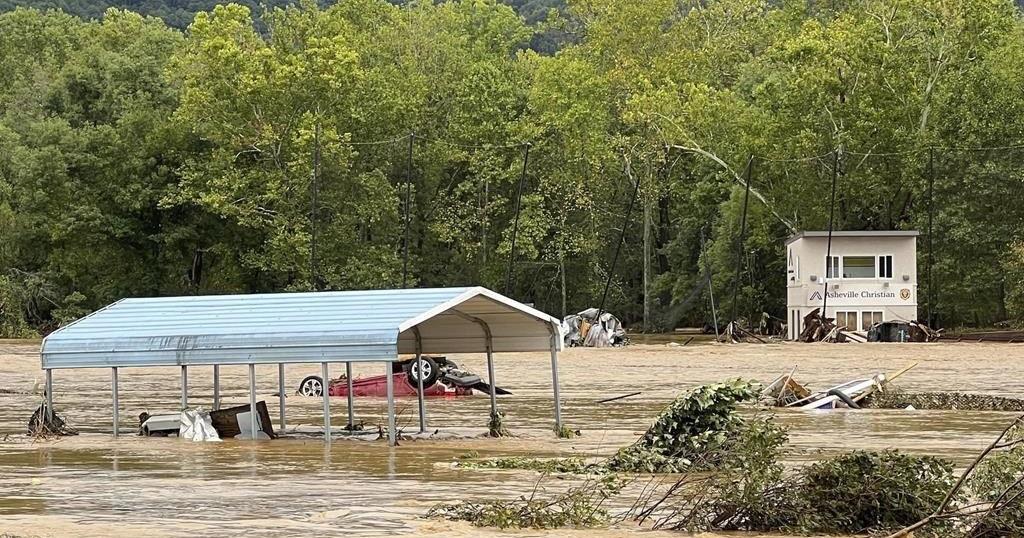Pisgah High School in western North Carolina reopened its football stadium last year after Tropical Storm Fred tore through in 2021.
Now it has to be rebuilt again after being demolished by Hurricane Helene.
Amid the lives lost and the catastrophic damage, high schools in dozens of communities in southern Appalachia are shut down and with that the prep sports that binds so many towns together. It’s the latest disruption for young athletes who’ve already endured a pandemic.
The Pigeon River rose to record levels after Helene plowed through, taking out parts of Interstate 40 along with bridges, homes and other infrastructure in the region. In Canton, North Carolina, the high school’s football, baseball and softball fields, covered in several feet of water, were “a total loss,” Pisgah athletic director Heidi Morgan said.
In an adjacent county, six dozen people have died. Morgan is keeping that in perspective as she ponders the monumental task ahead at her school.
“You cannot replace a life,” she said. “Material things, you can replace.”
First COVID, now this
The loss of Pisgah’s athletic facilities is personal for Morgan. She played softball there in high school and became its athletic director in 2019. She’s also the current softball coach.
“I’m sad for our kids. They’ve just been through so much,” Morgan said. “In high school, you have to have a sense of normalcy. Our seniors, they’ve played at Pisgah Memorial Stadium eight times in four years due to COVID and then the flood in ’21. It’s just heartbreaking.”
It’s also summoned a resiliency that Morgan processed during the first stadium overhaul that she hopes will help get her school through even tougher times.
“We’ll get our hands dirty again and we’ll rebuild and be back stronger than ever,” Morgan said. “We will come back.”
About a half hour to the east, the Swannanoa River swallowed up the outdoor athletic fields at Asheville Christian Academy. In Hampton, Tennessee, Hampton High School’s football stadium was destroyed by flooding from the Doe River.
Schools remain closed in many states as work continues on roads and other infrastructure. Some schools have become temporary Red Cross shelters. Others are accommodating utility crews. High school games have been called off for a second straight week, with many having no idea if or when practices or games might resume. Local police officers used for game security have other, more important things to do.
‘Push through it’
South Carolina was hit the hardest by power outages from the hurricane, posing one of the many challenges for young athletes.
“It does take a little bit of focus off the game and season because you have to worry about a lot of stuff that’s going on at home,” said Abraham Hoffman, a running back and wide receiver at American Leadership Academy, a charter school in Lexington, South Carolina. “It definitely causes a distraction.”
The school lost power for five days and the football team only recently returned to practice with its game postponed this week. But there isn’t time for self pity, considering what’s going on in every direction.
“We kind of just have to push through it,” Hoffman said. “You can’t sit back and let it affect you. Even though we went through it, it was tough, the hurricane and stuff, There are places that had it worse.”
American Leadership coach Robin Bacon spoke with two head coaches from other areas who said “‘this looks like an atomic bomb hit in some of these areas.’ It’s just so bad.
“We take for granted having a hot meal,” he said. “We take for granted having electricity. We take for granted that we can take a shower. And I’m talking to some of my football players and they’re like, ‘coach, we don’t have air conditioning.’”
Seeking a pause
The South Carolina Athletic Coaches Association is seeking a two-week postponement in football games on behalf of schools in the hard-hit western part of the state, where students “face extreme challenges that go beyond athletics,” association executive director Scott Earley wrote.
In the letter to the South Carolina High School League, the state’s governing body for high school sports that is scheduled to meet next week, Earley said many athletes “are unable to attend practice due to lack of transportation, closed schools and impassible roads. Others are prioritizing family responsibilities as they cope with significant losses.”
Gen Z giving back
In Boone, North Carolina, some of Brian Newmark’s cross country teammates at Watauga High School have damage to their homes or downed trees or destroyed bridges blocking roads. The team was still trying to figure out whether it can compete in a meet on Saturday in Charlotte, 100 miles away.
Until then, they’re prioritizing helping others. Newmark, a sophomore, handed out bottled water to needy residents for four hours at the school Thursday. The day before, the team cleared tree limbs, mud and other debris along a popular walking trail.
That sense of giving back makes Newmark proud about his generation, often seen as being too attached to electronics. Newmark said there is some truth to those complaints, but he and his classmates are doing their part to turn that reputation on its side.
“We’re working together to help each other,” Newmark said.
___
AP Sports Writers Teresa M. Walker, Aaron Beard and Pete Iacobelli and Associated Press writer Kimberlee Kruesi contributed.
___
AP’s coverage of the hurricane:
